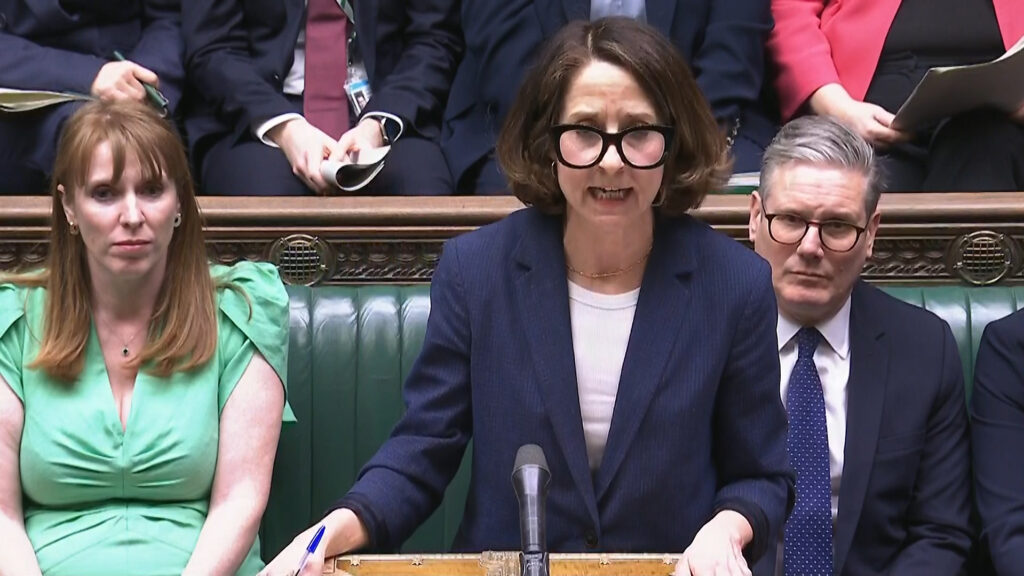Work and Pensions Secretary sets out overhaul of benefits system

An overhaul of the welfare system will see the assessment process for some health benefits scrapped and reform to disability benefits in a plan expected to save billions by the end of the decade.
Work and Pensions Secretary Liz Kendall said the current social security system is “failing the very people it is supposed to help and holding our country back”.
Groups representing disabled people condemned the “cruel cuts” as “immoral and devastating” as they argued the changes will “push more disabled people into poverty, and worsen people’s health”.
Assessment
Ahead of Tuesday’s announcement, MPs on Labour’s left and the party’s trade union backers hit out at the plans, arguing they would punish the disabled and the poor.
Addressing Parliament, Ms Kendall announced the “work capability assessment” for universal credit – which is used to determine eligibility for incapacity benefit payments based on someone’s fitness for work – will be scrapped in 2028.
She said instead extra financial support for health conditions will in future be based on a person’s health or disability, rather than their capacity to work.
She also said the Government will bring in a “permanent, above-inflation rise” to the standard allowance of universal credit as well as legislating to “rebalance” payments for the benefit.
Ms Kendall said this would equate to a £775 annual increase in cash terms by 2029.
She said this was a “decisive step to tackle the perverse incentives in the system”, with the Government previously saying the current system incentivises people to say they cannot work “simply to get by financially”.
Pip
She confirmed the Government will not freeze personal independence payment (Pip), as had been rumoured.
But she said they will legislate for a change to the assessment for a benefit which is aimed at helping the disabled with the increased cost of living associated with their conditions.
She said people will need to score a minimum of four points in at least one activity to qualify for the daily living element of the benefit from November 2026.
She said the Government will also review the Pip assessment, promising to consult with disabled people and organisations representing them, to ensure the process is “fit for purpose now and into the future”.
The Disability Benefits Consortium, an umbrella body representing more than 100 charities and organisations, said changes to Pip will make it harder for disabled people to manage “the overwhelming additional costs of their condition, from wheelchairs to visits from carers”.
“Any targeted cuts to disabled people on universal credit and employment and support allowance will largely hit those who are unable to work and rely on these benefits to survive,” he said.
“We are united in urging the Government to abandon these cruel cuts.”
Of the overall plan, Ms Kendall said: “This is a significant reform package that is expected to save over £5 billion in 2029/30 and the OBR (Office for Budget Responsibility) will set out their final assessment of the costings next week.”
Reports ahead of the announcements had suggested there was unease around the Cabinet table, with ministers including Deputy Prime Minister Angela Rayner and Energy Secretary Ed Miliband said to have voiced concerns in private.
But the Prime Minister’s official spokesman insisted the Cabinet is united in its agreement on the need for reform.
The Number 10 spokesman said: “Thee whole Cabinet agreed on the need for these reforms and supported the work and pension sector and introducing them, and the crucial importance of addressing a system that has left people trapped out of work and is not supporting people back into work.”
The Office for Budget Responsibility has forecast that spending on health and disability benefits for working-age adults will increase from £48.5 billion in 2023/24 to £75.7 billion in 2029/30.
The announcement comes a week ahead of the spring statement, as Chancellor Rachel Reeves struggles to balance the books in the face of weak economic growth and mounting debt interest costs.
Support our Nation today
For the price of a cup of coffee a month you can help us create an independent, not-for-profit, national news service for the people of Wales, by the people of Wales.






What about suspending state pension benefits for millionaires? That would save over £30bn.
Increase taxation beyond a certain level of income – a few % points at over say £100k, a few more on any income over say £200k That ought to capture a lot of people.
But is a gift to the RefCon coalition.
Agree.
But it’s a tough decision!!!
Tax the rich and give to the poor.
They have no idea as to the pain they will cause.
They have no idea.